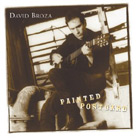October 2002
On Postcard, Broza composes musical settings for poems by Percy Bysshe Shelley, Yehonatan Geffen, Liam Rector, and Matthew Graham. A skilled guitarist, Broza has good rhythm and timing. His arrangements are uncluttered; everything is clear, including the words he sings, though if you don’t know Hebrew, you must read translations in the liner notes to understand some of them. His singing voice is neither bad nor particularly remarkable. The poems Broza has chosen range from pretty good to excellent. As poems, they were written to stand as words only. Poems that cannot do that fail. Putting them to music runs the obvious risk of violating the most fundamental aesthetic principle: economy of means -- less is more. It is an entirely different affair than a songwriting collaboration in which one person writes the words, another the music; in such cases, words are written to be put to music, not to stand alone. The first stanza of "Chileno Boys" (Alberto Rios), a striking example, reads, "The Chileno Boys/Pull their fish by the fins/In the dirt and they sing/About old times and the women they will know/Mariquita and Caras/The girls in their dreams of when they’ll be men." The lines "Not different, not different they say/Not different from you" appear after each of the poem’s three stanzas. The poem subtly and delicately contrasts boys’ dreams with the reality that is their future. Broza, however, uses a rapid tempo and Santana-like arrangement and repeats the "Not different …" part ad infinitum, suggesting the song is about the trite truism that people are all the same under the skin. That flaw -- diminishing the poems by adding meaningless flourishes -- is unfortunately repeated again and again. Rather than heighten poetry’s effects as Beethoven unquestionably does in his Ninth Symphony, Broza mostly reduces the poems he sings to pop-song notions. He accomplishes that partly by singing with familiar, overused inflection so often mechanically applied that listeners often fail to notice it doesn’t communicate much. One exception is Shelley’s "If You Don’t Kiss Me," which Broza performs more straightforwardly than most of the others, allowing the lines’ rhythms to determine his, rather than the other way around. If you believe that singing in more than one language and performing in more than one ethnic style helps unite people from diverse societies, you will find that an encouraging aspect of Painted Postcard. I don't, but there is no harm in trying, of course, and many people will wish to hear David Broza for themselves -- if only to discover what they think of his efforts. GO BACK TO: |
 David Broza - Painted
Postcard
David Broza - Painted
Postcard![[Reviewed on DVD]](../format/regcd.gif) David
Broza's first album, recorded in 1978, consisted of Hebrew poetry he put to music.
"The album was very successful and launched me in Israel," he says in the liner
notes he penned for Painted Postcard. In the quarter-century since, Broza has
released many albums, of which Postcard is the first I have heard.
David
Broza's first album, recorded in 1978, consisted of Hebrew poetry he put to music.
"The album was very successful and launched me in Israel," he says in the liner
notes he penned for Painted Postcard. In the quarter-century since, Broza has
released many albums, of which Postcard is the first I have heard.